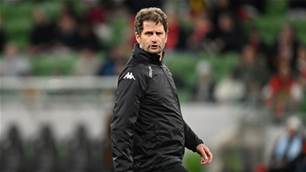It's not all doom and gloom. Football Federation Victoria has shown how a unified, strategic approach can generate huge amounts of funding to help supercharge football. In their case, $118 million worth.
Leveraging football’s grassroots power strategically to help unlock millions of dollars in funding for grassroots and, potentially boutique stadia, has left Victoria’s ambitious federation believing they know how to win the political football game.
Football Federation Victoria (FFV) estimates that in just 10 months last year, they unlocked $118 million in funding.
With the imperative of a state election last November - which all comes with marginal seats and funding commitments - FFV say they've built a model of advocacy that all other states and FFA could learn from.
Heading this new strategy was CEO Peter Filopoulos, who joined in May last year from A-League outfit Perth Glory.
“There were several components,” Filopoulos explained to FTBL. “It started with a comprehensive government-funded facilities strategy.
“Based on participation growth we’re expecting over the next eight years and population growth, the facilities strategy went municipality to municipality.
“And based on growth predictions, we saw we’d be short 420 full-size pitches by 2026.
“So that really started a whole narrative with the government. They realised they had a problem here.
"And we could support that with data such as 12,500 boys and girls missed out on an opportunity to play the game because facilities at clubs had reached saturation point."

With the findings and predictions of growth in place, selling the narrative to local and state government was the next step. FFV replicated what sports such as the AFL have been doing for years.
They built a policy platform that also was part of FFV’s broader strategic focus signed off by the board, led by Chairman Kimon Taliadoros.
“So the next part was we got FFA in the room, FFV and a team of lobbyists, and a facilities strategy person and a corporate affairs consultant," Filopoulos said.
“And we built a policy platform that was all-encompassing. It took about five or six weeks. Through this, we wanted a significant world game fund that we can leverage with local governments to create new facilities and infrastructure.”
Much of this was for gender-equality change-rooms to accommodate the huge growth in women’s football, as well as floodlights, synthetic pitches, clubhouses and a home of football, mooted as a training base for the Matildas.
The advocacy process began in what was an election year.
Government sources tell FTBL that some of the FFV’s funding has taken money off the table for the AFL, who for years have had a similar, strategic campaign but lacked the 'compelling narrative' FFV were now able to tell.
“All together with all leverageable components, we’ve unlocked about $118m to date in just 10 months," explained Filopoulos.
With this in mind, Football NSW, Northern NSW, and Capital Football have undertaken a "comprehensive NSW/ACT facilities audit to determine the current state of play, develop a plan for the future and provide decision-makers with a clear picture of where there is the greatest need," Football NSW said this week.
"A key finding of the 10-month audit was that, based on current participation and annual growth rates, by 2030 Football in NSW will be 700 pitches short and will need to work with Councils and Governments to find additional fields of play for as many as 120,000 participants.
"The findings demonstrated that 45% of all pitches had no irrigation and/or drainage, resulting in pitches becoming unplayable. Loss of training nights and match days in some areas is as much as 25% resulting in a less enjoyable football experience and uneven competitions when many matches are cancelled."
In NSW,
- Just 54 pitches are synthetic
- 32% of playing grounds have no lighting
- 42% have lighting which is considered inadequate for football
- Only 41% of playing fields have irrigation and drainage
- 45% have no irrigation at all
There is also a NSW state election next month and while it's perhaps too late for a similar campaign, FNSW are keen to plan for the next state election.
Filopoulos believes FFV have demonstrated what can be done. And with eight years working in the AFL, he has experience in what’s needed.
His advice to other states was to adopt a statistical approach.
“In the past, we’ve been banging our fists on the table without backing it up with a compelling case and real data.
“My advice to NSW and other states is that Government needs real thought through strategic, data-driven information that's strongly backed. Surround yourself with experts and specialists.
“Broadly, there has to be a national approach to this kind of advocacy with a local element as each state is different as you build the narrative.
“If we want to achieve more from the government then we need to learn from the way the best do it. And in this case, it’s the AFL.
"They are the best at working on their narrative. We’ve got it, but we seem to air our dirty laundry rather than telling our narrative in a strategic fashion.”
FFV are now planning for the next Federal Election on the back of 24% growth year on year from 2017.
“We’ll be continuing this campaign to the next Federal Election campaign. It was a proven approach.
“So, that’s how we did it. A lot of meetings at Parliament House and hitting the pavement and having a strong narrative," Filopoulos added.
“Some of the feedback we got from the government was that our policy platform was one of the best documents they’d seen and a great value proposition that football has put together.
“And I just remember presenting this to the Minister of Sport and he said, ‘finally I’ve got something I can actually take to Cabinet and get the funds.
“It was undeniable. And it gave them a reason to take that into Cabinet.
"And it resonated with Cabinet and sent shockwaves. We are the only growing sport and we’re getting a massive growth in girls and the growth’s going to continue based on projections.
“If we addressed this facilities gap,” added the CEO, “we’re going to grow exponentially.
“And it was going to get worse unless government acted.”
According to Filopoulos, this is only just the start.
He says this policy platform can reap huge benefits in the future as FFV continue to fine-tune their approach to the decision makers and funding models.
“We put this together very quickly,” he said.
“But now we’re focused on the Federal campaign and we have certain strategies to deliver an outcome for us.
“We believe we haven’t even scratched the surface.”
Related Articles

'Timing not right': Montemurro's verdict on Matildas vacancy

Matildas: 'Fourth at the Olympics is honestly the worst place you could come'
.jpg&h=172&w=306&c=1&s=1)











